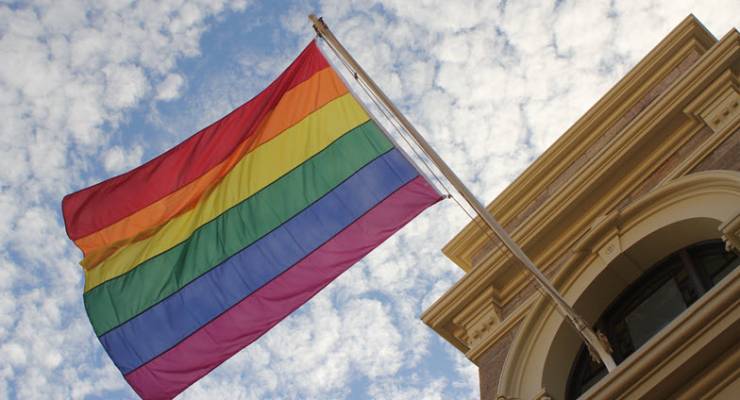
Marriage equality proxy wars continue to flare up around the country. This time, the local council of Monash, in Melbourne’s south-east, has decided it will not be painting the town rainbow, with councillors refusing to discuss a motion to install rainbow lights within the city.
Last Tuesday, Monash councillor Josh Fergeus put forward a motion to have the Monash Civic Centre and the Euneva car park lit with rainbow lights in support of marriage equality from October 1 until the end of the survey process. But his colleagues declined to even discuss it.
“I put forward the motion as a matter of urgent business, because I felt if we waited until our next meeting on October 31, there would be only two weeks left in the campaign, and that would make the gesture less likely to be effective,” Fergeus told Crikey. “A lot had moved in the debate since our last meeting — the ballots had arrived, there had been a lot of publicity, and I was starting to receive reports from residents and their families about how the process was affecting them.”
Fergeus said that eight of 11 councillors voted against the matter being discussed.
“Just to be clear, there was nothing stopping them allowing the motion be discussed and then voting against it,” he said. “But they clearly preferred not to have the public debate.”
Port Phillip Council and Melbourne City Council in Melbourne both lit up their town halls, the Australian Local Government Association passed a motion calling on the federal government to support marriage equality in June 2016, and 52 councils across Australia have passed motions in support of marriage equality.
At a meeting in February, Monash declared its support for “residents and employees in advocating for marriage equality”. The full motion (submitted by Fergeus) said the council:
- Supports residents and employees in advocating for marriage equality, regardless of sexual orientation or gender identity;
- Supports the right of all Council employees and residents to have equal opportunities in life, supports diversity in the workforce, and recognises the right of all employees and residents to live and work free of prejudice and discrimination; and
- Note, that as part of its commitment to celebrating diversity, Council supports Lesbian, Gay, Bisexual, Transgender, Intersex and Queer/Questioning (LGBTIQ) community events, activities and capacit building opportunities including Pride March and the Midsumma Festival.
So why the reticence about making a visual statement? Fergeus says it is worth interrogating the exact language of the council’s declaration.
“Our motion is a little different than other councils’ — it was tweaked to we say we support staff and residents in their campaign for marriage equality, not that we ourselves are in favour of it,” he said.
“Even that compromised version wasn’t overwhelming voted through — some of our councillors just think the discussion is divisive, that we should stick to roads, rates and rubbish, and that it isn’t the role of our council to be publicly advocating around social issues.”
Monash falls within the federal electorate of Bruce. While local Labor member Julian Hill is publicly supportive of marriage equality, there is just 53% support for marriage equality in Bruce, the equal lowest (along with Calwell) for any electorate in Victoria. Bruce is one of the most ethnically diverse electorates in Australia — with large Chinese, Vietnamese, Indian, Greek and Turkish populations. Just over 50% of its residents were born overseas, and 82.5% consider themselves religious. While neither the religious nor ethnic communities are monoliths on the subject of marriage equality, both are considered more likely to vote no.
Monash mayor Rebecca Paterson told Crikey that declining to put up rainbow lights was not a reflection on the council’s view of marriage equality.
“Councillors voted on whether this particular motion should be admitted as an urgent business item and determined that it did not meet the criteria of urgent business,” she said.
“That is no reflection on council’s support or otherwise for the issues raised by the motion, only that the motion did not meet the criteria for urgent business. The council’s decision in February was to support the community and employees advocating for marriage equality and that position has not changed.”
Monash Council is a relatively even split between Liberal, Labor, a single Green (Fergeus) and two independents. Notably, councillors include disendorsed 2013 Labor candidate for Hotham Geoff Lake and former Labor candidate for Aston Paul Klisaris, while Theo Zographos (who ran for Oakley in the 2010 state election), Robert Davies (who ran for Mulgrave against Premier Daniel Andrews in 2014) and MT Pang Tsio are all Liberal-affiliated.








Hmm! After reading this what is the point of the Article – A Council prudent enough not to spend ratepayers money frivolously –
Whilst not being Fake news is it Alt-news? No wonder journalism is having a hard time.
Oakleigh, not Oakley.
Incredible that the High Court of Australia can determine the expenditure of $122 million for an unnecessary, useless, non-binding postal survey is urgent but a local council, faced with a very short time-frame on an initiative that would cost it nothing and give back so much can’t come to a similar outcome.
Shows one how bad the High Court is!